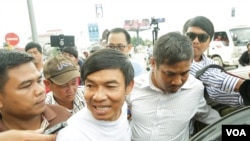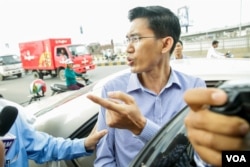Phnom Penh police assert two former Radio Free Asia reporters were engaged in espionage after they allegedly used a guesthouse to send news reports to Washington.
The two journalists, Oun Chhin and Yeang Sothearin, were put under the jurisdiction of the municipal court and accused of “supplying secret information to a foreign state.”
If found guilty, they could each face prison terms of between seven and 15 years, authorities said.
Sim Vuthy, a municipal police chief, said: “We have already submitted enough evidence and documents, including their action plans, their answers, and some more, so we can conclude that it is a conspiracy.”
He did not say what “secret information” the reporters were alleged to have sent to the United States.
The two reporters were detained on Tuesday at the Marady Hotel in Phnom Penh, where they were allegedly in the process of setting up television equipment.
Both of the reporters denied the allegations of wrongdoing.
Their former employer, RFA, closed its bureau in Cambodia in September after what it described as a systematic campaign by the government to end its operations in the country. RFA was one of a number of foreign media outlets targeted by the government in recent months, including The Cambodia Daily, owned by an American, and Voice of America's Khmer Service.
Despite the closure of its' in-country reporting operations, RFA continues to broadcast Khmer-language news programs over short-wave radio and online from its base in Washington. RFA and VOA are international news broadcasters operating in multiple languages. Funding is provided by the US Congress.
After RFA’s Cambodia bureau closed, the government warned it would take legal action against RFA staff who continued to work for the broadcaster.
Rohit Mahajan, an RFA spokesman in Washington, said in an email on Wednesday that the reporters had “no relationship–contractual or otherwise–with RFA to provide news or other services.”
Sok Sam Oeun, a Cambodian legal specialist, said the charges only made legal sense if the information allegedly supplied to a foreign state was prejudicial to national security.
“If sending information abroad is wrong, people using Facebook who share information, which can be seen globally, should all be arrested,” Sok Sam Oeun said.
Ly Sophana, a court spokesman, confirmed the court had received the case from the police and “will process it in accordance with the legal process.”
The detentions have drawn international criticism from Reporters Without Borders and the Broadcasting Board of Governors, the US federal entity that oversees RFA and VOA.
The Reporters Without Borders' statement released Friday also expressed concern about the Thursday detention of former Cambodia Daily reporter, Len Leng, who was subsequently released. She was taken into custody outside the Supreme Court, which ruled Thursday to dissolve the opposition party, Cambodian National Rescue Party.
''These latest cases clearly show that the law and the judicial system are being used to suppress any independent reporting and, above all, to intimidate the entire press,'' said Daniel Bastard, the head of Reporters Without Borders' Asia-Pacific desk.
''We relay and share the deep concern of many journalists on the ground after these arbitrary arrests. International organizations need to understand the gravity of what is happening in Phnom Penh,'' Bastard said, according to the statement. ''The denial of media freedom means the end of a 25-year year democratic transition after the trauma of the Khmer Rouge genocide.''
John Lansing, the CEO of the Broadcasting Board of Governors, issued a statement Friday expressing concern for the well-being of the two former RFA journalists.
''We hope they will be released unharmed and immediately to their families,'' Lansing said.
The statement from Lansing confirmed the two detained journalists worked for RFA until September ''when the network was forced to suspend its in-country operations.''
''It is being reported that the two are being held under suspicion of continuing to work for RFA, despite the network's suspension of operations in Cambodia and the fact that their relationships with RFA, contractual or otherwise, discontinued in September,'' he said.
''While these continuing acts of intimidation are meant to instill fear, they only underscore the BBG's support for our networks and journalists, including those at RFA and Voice of America, and our resolve to continue providing the Cambodian people with unbiased, objective news,'' Lansing said.
''Press freedom is a basic human right and should be a universal priority. When we lose independent voices, we run the risk of conceding the information space to hostile regimes, extremists and rogues.''






